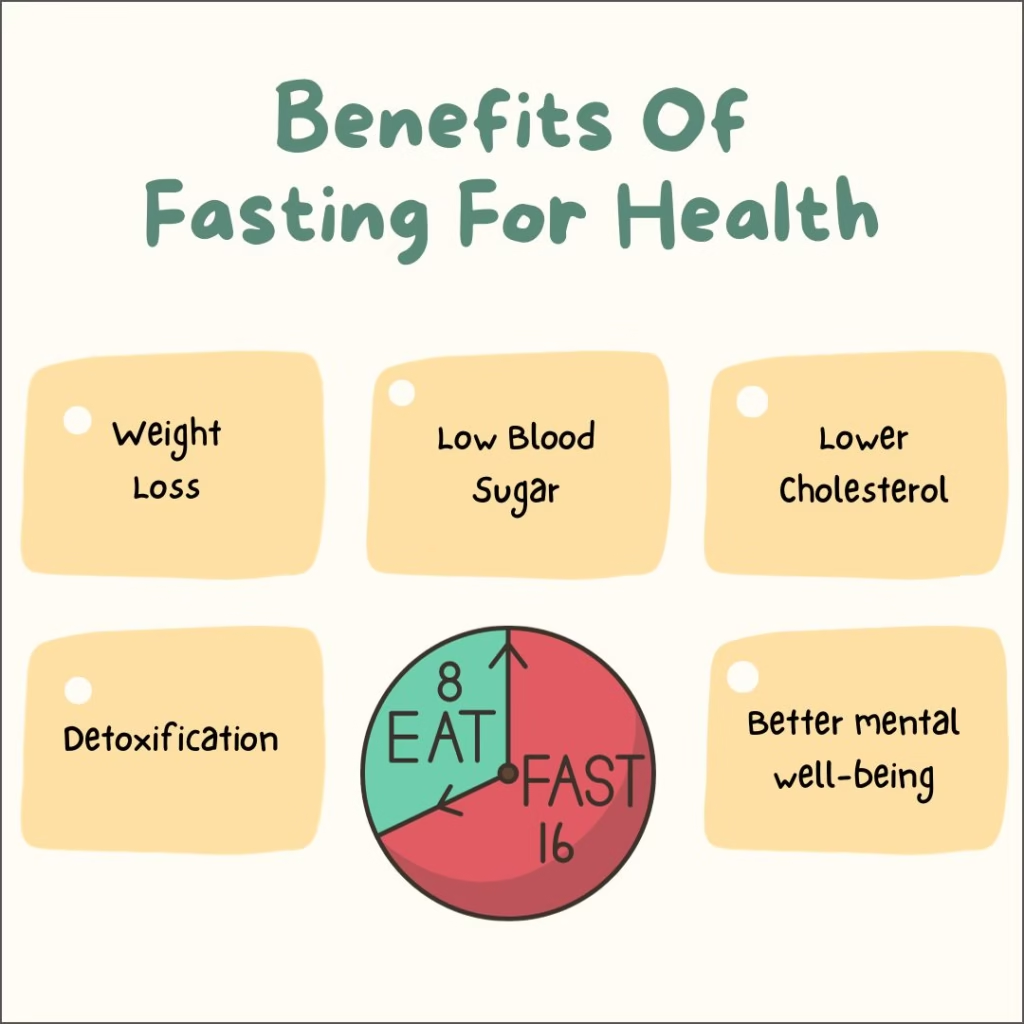
Intermittent fasting has gained traction as a powerful wellness practice, embraced by people of all ages for its profound effects on physical, mental, and spiritual health. From improving digestion to enhancing mental clarity, this natural health strategy aligns perfectly with holistic living. Let’s dive into the benefits and methods of intermittent fasting from a holistic health coach’s perspective.
What is Intermittent Fasting?
Intermittent fasting (IF) is an eating pattern that cycles between periods of eating and fasting. Unlike traditional diets that focus on what to eat, intermittent fasting emphasizes when to eat. Popular methods include:
- 16/8 Method: Fasting for 16 hours and eating within an 8-hour window.
- 5:2 Diet: Eating normally for five days a week and consuming reduced calories for two non-consecutive days.
- 24-Hour Fast: Fasting for a full day once or twice a week.
Benefits of Intermittent Fasting for Holistic Health
1. Supports Digestive Health
Intermittent fasting allows the digestive system to rest, promoting better nutrient absorption and reducing inflammation in the gut.
- Key Insight: Studies show fasting can improve gut microbiota diversity, crucial for optimal digestive health.
2. Enhances Energy and Wellness
By stabilizing blood sugar levels and optimizing metabolic function, fasting provides sustained energy and combats fatigue.
- Holistic Approach: Integrating mindful eating during eating windows can amplify these benefits.
3. Promotes Natural Detoxification
Fasting activates autophagy, a process where the body removes damaged cells and toxins.
- Statistic: Research highlights that autophagy increases during fasting periods, aiding in natural detox and cellular repair.
4. Balances Hormones
Intermittent fasting supports hormonal health by improving insulin sensitivity and regulating hunger hormones like ghrelin and leptin.
- Holistic Healing: Balanced hormones lead to better mood, appetite control, and overall well-being.
5. Boosts Mental Clarity and Spiritual Connection
Fasting isn’t just a physical practice; it’s a tool for mental clarity and spiritual growth. The act of fasting encourages mindfulness and intentional living.
- Spiritual Benefits: Many cultures use fasting as a spiritual practice to foster a deeper connection to self and purpose.
How Intermittent Fasting Supports Natural Healing
Fasting aligns with the body’s natural rhythms, enhancing its innate ability to heal and regenerate. When practiced holistically, intermittent fasting becomes more than a dietary trend—it’s a lifestyle choice that integrates mind, body, and spirit.
Intermittent Fasting for Digestive Health
- Improves gut motility and reduces bloating.
- Allows the digestive system to reset, promoting better enzymatic activity.
Intermittent Fasting for Hormonal Balance
- Helps regulate cortisol levels, reducing stress.
- Supports thyroid function and reproductive health through balanced nutrition during eating windows.
Mindful Fasting Practices
To make intermittent fasting a sustainable and holistic part of your life, consider these mindful tips:
- Listen to Your Body: Begin with a fasting method that feels natural to you, and adjust as needed.
- Hydrate Well: Drink plenty of water, herbal teas, or mineral-rich broths during fasting periods.
- Focus on Nutrient-Dense Foods: During eating windows, prioritize whole, unprocessed foods that nourish the body.
- Practice Gratitude: Use fasting periods to reflect and practice mindfulness, creating a deeper connection to your wellness journey.
Intermittent Fasting and Statistics
- Digestive Health: A 2020 study found that intermittent fasting improved symptoms of irritable bowel syndrome (IBS) in 70% of participants.
- Mental Clarity: Research shows a 30% increase in cognitive performance during fasting periods due to enhanced brain-derived neurotrophic factor (BDNF) levels.
- Weight Management: Intermittent fasting can lead to a 3-8% reduction in body weight over 3-24 weeks, according to clinical trials.

A Holistic Guide to Intermittent Fasting
How to Practice Intermittent Fasting for Holistic Health
- Begin with shorter fasting periods, such as the 12/12 method (12 hours of fasting, 12 hours of eating).
- Integrate mindfulness exercises like yoga or meditation to enhance the spiritual benefits of fasting.
- Use fasting as an opportunity to cultivate gratitude for food and nourishment.
The Benefits of Mindful Intermittent Fasting
Intermittent fasting, when approached holistically, becomes a tool for transformation. It not only improves physical health but also nurtures mental clarity and emotional balance. By practicing mindful eating and honoring your body’s natural rhythms, you can unlock the full potential of fasting.
Conclusion: Fasting as a Natural Wellness Practice
Intermittent fasting is more than a wellness trend; it’s a timeless practice rooted in holistic healing traditions. By integrating fasting into your lifestyle, you can enhance your physical health, achieve mental clarity, and foster a deeper connection to your body and spirit. As a holistic health coach, I encourage you to approach fasting with mindfulness, balance, and an open heart. Your journey to wellness begins with one intentional choice at a time.
